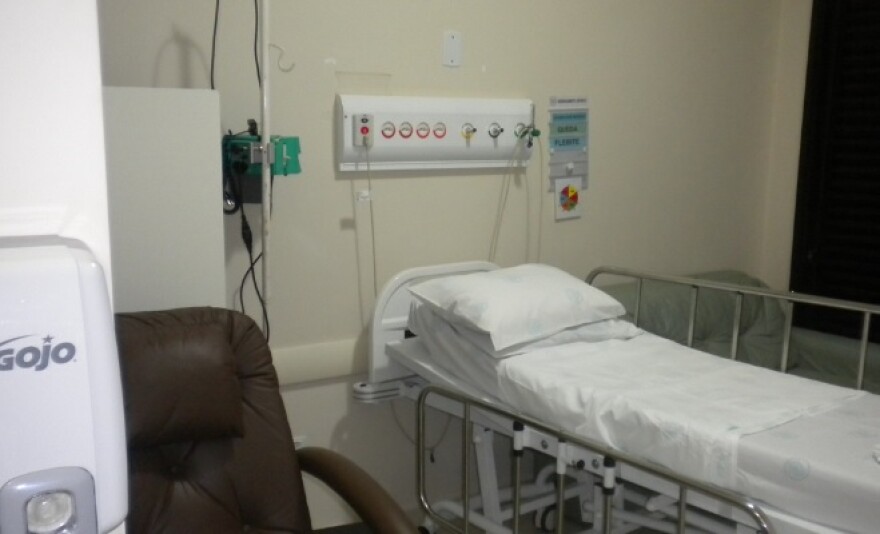As they worked to craft the state's next budget, Florida lawmakers got some unexpected help Wednesday: hundreds of millions of dollars in federal funding for hospitals that could free up state money to be spent elsewhere.
Gov. Rick Scott announced a deal with the federal government on the Low Income Pool program, also known as LIP, as the House and Senate worked into the evening debating state spending plans for the year that begins July 1. The Low Income Pool provides money to help care for poor and uninsured patients.
Scott, a strong supporter of President Donald Trump, credited the new president with helping reach the deal on the funding for LIP, which appears to be about $900 million more than the $607 million the program received for the year that ends June 30.
"Working with the Trump Administration to secure a commitment of $1.5 billion in LIP funding for our state will truly improve the quality and access to health care for our most vulnerable populations," Scott said.
The governor also fit in a dig at former President Barack Obama, whose administration tussled with Scott and Florida House Republicans two years ago about the connection between Medicaid expansion and LIP funding.
"It is great to have a partner in Washington who is willing to work with us to help our state," Scott said.
It wasn't immediately clear the exact dimensions of the increase from the federal government. LIP is a matching program that also draws funding from local sources.
The Senate voted unanimously Wednesday to approve its 2017-2018 budget proposal, which banked on $607 million being available for the LIP program. The overall Senate budget plan amounts to about $85.1 billion when all funding sources are taken into account.
The increased LIP funds could allow the state to tap money that had been used to help hospitals cope with declining LIP money under Obama.
Senate President Joe Negron, R-Stuart, welcomed the agreement but said it would take time to figure out how much the funds could help other areas of the budget.
"I think it's too early to tell exactly how we would do that and what the logistics would be," Negron said. "But it's a very positive development for putting our budget together."
The House did not include any of the LIP money in its spending plan, which weighs in at about $81.2 billion and is expected be approved Thursday.
House leaders were even more cautious about the LIP issue Wednesday. Appropriations Chairman Carlos Trujillo, R-Miami, said it wouldn't be wise for the state to use any savings related to the LIP money, which is doled out annually, for year-to-year state needs.
The House has pushed to pare down the budget this year in part because of projected shortfalls in the future.
"We would probably like to use it either (in) tax cuts or put it straight into reserves and shore up some more reserves for the out years," Trujillo said of the possible money.
Scott's announcement came during a lengthy day of debate over the spending plans on both sides of the Capitol. With the Senate passing its budget Wednesday and the House poised to approve its proposal Thursday, the two chambers will be positioned to start negotiations on a final spending plan.
Senators plowed through roughly four-dozen amendments dealing with everything from funding for an anti-death penalty prosecutor in Central Florida to how to combat the state's opioid epidemic.
Discussions in the chamber grew personal at times, particularly as Sen. Tom Lee, who chaired the Senate Appropriations Committee last year, clashed with his successor, Sen. Jack Latvala, over how much money was set aside in the budget for reserves and for negotiations with the House.
"I don't remember having this kind of detail when you were the appropriations chairman," Latvala, R-Clearwater, said at one point. "We have to obviously have a little flexibility as we go into conference."
"I'm about to vote on an appropriations bill, and I think I have a right to know what's in it," responded Lee, R-Thonotosassa.
Lee has become an irritant to Senate GOP leaders and has grown increasingly isolated in the upper chamber. Latvala suggested during the back and forth that Lee might be trying to draw out information for House Republicans.
House members, meanwhile, clashed on a program meant to encourage non-profit charter school operators with track records of high performance among low-income students to open campuses in areas where traditional public schools have received "D" or "F" grades on state reports cards for more than three consecutive years.
The House budget proposal would set aside $200 million for the "Schools of Hope."
During discussion of a measure creating the program (HB 5105), Democrats repeatedly asked supporters why the funding should not be used to instead help the troubled public schools.
But Rep. Chris Latvala, son of the senator, argued that a new approach is needed, particularly given that some extra help is currently funneled towards lower-performing schools.
"These schools are already receiving more funding," said the younger Latvala, R-Clearwater. "These students are already receiving more funding."
But opponents see the legislation as part of a continuing effort to privatize education by expanding the reach of charter schools, even though such schools are public.
"We're creating a segregated system that will not fix the issue but is going to create deeper issues, putting charter schools against our public school system," said Rep. Shevrin Jones, D-West Park, during a press conference Wednesday before the House began its budget discussions.

